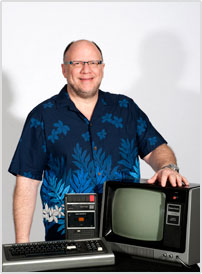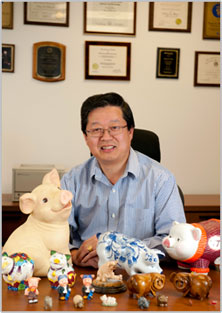PROFESSOR PROFILES

Stephen Edwards, associate professor of computer science with the College of Engineering, loves to create. Some paint with a brush or write poetry with a pen. Edwards builds with a computer. Not buildings or animated films, but educational tools for students. Edwards' most prominent project is called the Web-based Center for Automated Testing, or Web-CAT, a flexible, tailorable, Web-based automated grading system that has been adopted by 75 institutions nationwide and is the most widely used open-source grading tool of its kind in the world. For his efforts, Edwards was named an Outstanding Faculty Award winner by the State Council of Higher Education for Virginia.
Computing is about creating new solutions or new ways of doing things that transform how we work and live. Many of us love expressing our creative side in different ways, but computing is one area where what you can create is limited only by your imagination and how you envision what you are creating, rather than by the physical skills of your hands or your senses. This aspect of computing can speak to the "builder" or "maker" in all of us. ... The thrill of creating something new, using just the power of your mind, and seeing it work for the first time—that is the cool part of computing that grabbed me from the very start.
When I talk to people outside of computing about Web-CAT, I describe it in terms of students self-checking their own work. That's something all educators believe in; but prior to Web-CAT, there was no readily available way for computing educators to reinforce this practice or to give students feedback on how well they were checking their own work. Few computing educators talked about how to introduce more systematic self-checking into their courses. Since the introduction of Web-CAT, these ideas have moved from the fringe into the mainstream. Most major educational conferences in computing regularly include papers or presentations where people share their experiences using this approach or even share their research results on how requiring students to self-check their own software affects learning. I am very proud to have played some small role in encouraging this change.
I get a lot of my inspiration from the creativity and enthusiasm of other people. One of the great things about working at a university is the number of students and colleagues you run into who are passionate about their own projects or ideas. The volume of new ideas or innovative solutions is amazing. There's never a shortage of inspiration for great new directions to explore.
It would be really fun to spend some time working as a Lego Master Model Builder. I played with them constantly as a child. My son and daughter have played repeatedly with a classic set I still have from my childhood. More recently, once my children were in elementary school, I started coaching for the First Lego League, a program to engage students with science and technology by having them build and program robots made from Legos. I coached elementary and middle school teams in Blacksburg for six years.
Dr. X.J. Meng is trained in both human medicine and veterinary science and is a professor of molecular virology at the Virginia-Maryland Regional College of Veterinary Medicine. The Qingdao, China native was named a University Distinguished Professor in 2013, the first from the veterinary college to hold the prestigious title. In addition to his teaching duties, he researches antiviral vaccines and the molecular biology of viruses.
I completed medical school in China with intentions of becoming a surgeon. I briefly practiced medicine part-time, then enrolled in a microbiology graduate program where I worked in a virus research institute. I became totally fascinated by viruses, the smallest and simplest form of life on earth.

Many animal virus diseases are zoonotic, which means they not only infect animals, but can transfer from animals to people as well. In fact, the majority of human emerging virus diseases can be traced back to an animal origin. For example, the deadly SARS virus came from the horseshoe bats, and the current pandemic H1N1 influenza virus is of swine and chicken origin.
I teach emerging infectious diseases, as well as molecular virology classes. I also help team-teach a veterinary virology class, which I really like because of the incredible veterinary students we have in the college. They are very mature, their questions are right on point, and they are scary smart. It really keeps me on my toes.
No, there are major risks associated with surgery as a profession. If you mess up, you can lose a life. If I mess up in the lab, I can just do it again. My mother, however, has never been truly impressed with my decision to forego becoming a surgeon to work with animal diseases. When I see her, sometimes she asks me, "I sent you to medical school, right? Are you still working with pigs and chickens?"
Yes, we serendipitously discovered the swine hepatitis E virus from pigs, then two years later discovered avian hepatitis E virus from chickens. Both were very important because they infect across the species barrier, and the swine virus also infects humans. We also study several other emerging viruses that cause economically important diseases in pigs. Indeed, the vaccine we developed against the porcine circovirus has probably saved the global swine industry hundreds of millions of dollars as the vaccine is currently on the global market in more than 50 countries.
Yes, in fact, I wrote a short novel while in medical school, but it was rejected by the publisher. That pretty much ended my writing career. Who knows, I could have been another Robin Cook.
To call John Boyer (geography '96, M.S. '98) colorful would be an understatement. The senior instructor of geography in the College of Natural Resources and Environment teaches a World Regions class that sometimes approaches an enrollment of 3,000, and he has a knack for landing guests who are household names—including a video message from the king of Jordan and a visit from Martin Sheen and Emilio Estevez. His alter ego, the "Plaid Avenger," fights ignorance of global issues from the pages of a comic book.
Because they asked me! I'm also passionate about bringing the world into the classroom. I'm convinced that's the future of the classroom. I took students to the European Commission in Brussels, to Normandy Beach. The real experiment for me was that I still taught a couple thousand students at Virginia Tech. For the first time ever, the World Regions class was entirely online, and I peppered it with live reports from the field.

Global ignorance. Any philosopher will tell you that if you sit down and check out the world, what you will quickly realize is that people are the same everywhere. They want to provide a better future for their children. That's the human condition. The rest—the differences—are petty. If we want humanity to survive the problems of the next 100 to 1,000 years, we're going to have to do a lot better at bringing people together. All the people. Everywhere.
Most politicians and pundits want to crystallize the world into black and white. "You're with us, or you're against us." But there are many threads—social, religious, geographical, political, historical, cultural. That's the weaving together, the plaid, of any place. What I try to do is tease out those threads. That's how I try to teach people. It's a way of understanding the world.
For the same reasons that movie theaters will never go away. A comedy is always funnier if there are 500 people laughing with you. There's something to be said for communal experience—to laugh together, ask questions together, get confused together, work together. I like the scale of it, I like the power of it. ... I believe the future iteration of what I'm going for is a hybrid model—an online course with a couple thousand people. I'll do podcasts from around the world, country, and commonwealth, and pull in speakers by going to their offices. And then we'll maintain that physical sense of community by getting together in Burruss [Hall auditorium] for some play or class or movie every couple of weeks.
She's an awesome human being, and she can even convey that through Skype. I still remember students walking out of class teary-eyed, saying their lives had just changed. That's what we're here for. That's what the university's about: opening eyes and changing lives. Teaching is a seriously undervalued profession. I'll debate it with anyone. If you want your society to be the greatest and have the most success, then invest everything in education.
I'm totally fearless in the classroom, inventing new ways to connect with students. I fail a lot. I do stuff some people don't like. But I refuse to stop trying. We're in an age that's all about change in education. We have real-time access to every corner of the planet, to every human being, and we're not doing nearly enough to harness that to bring it into the classroom.
Produced by University Relations